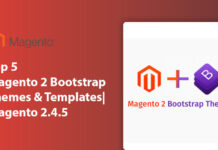
Running a Magento business is an appealing activity with several potential for expansion and consumer involvement. The advantages do, however, come with challenges, mainly about security. Cyber threats shift at all times, and attackers looking to take advantage of flaws frequently target eCommerce platforms like Magento. As such, putting strong security measures aside is not just recommended but also necessary. This blog will take you through the best practices and necessary security measures to keep your Magento store safe.
Table of Contents
Why you need to protect your Magento store?
Magento is a superstar in the eCommerce world, offering a variety of features that make shopping interesting for your customers. But with great popularity comes great responsibility that’s to keep it safe and secure.
That’s because sneaky online criminals often target Magento stores. Some tricks they go with, include fake login attempts (brute force attacks), hiding malicious code (XSS), and trying to steal information directly from your store (SQL injection). But don’t worry, by understanding these threats, you can take steps to secure your Magento store and keep it safe.
15+ best Magento security measures and techniques to protect your online store
Without further ado, let’s dive into some ways to do just that.
#1. Regularly update Magento and extensions

Magento regularly makes patches and updates available to fix security flaws. Maintaining your store’s security measures requires you to stay up to date with these advancements.
- Update the core software: Make sure you always have the most updated version of Magento installed. Security fixes to address known vulnerabilities are often found in these updates.
- Update extensions: If third-party extensions are not kept up to date, safety concerns may arise. Ensure that all of the installed extensions are updated and have been obtained from reliable sources to reinforce your security measures.
#2. Implement strong password policies
Make it tough for cyber attackers to steal your customer data by implementing strong security measures, including robust passwords.
- Password complexity: Enhance your security measures by using a combination of upper and lowercase letters, numbers, and symbols. This makes it more difficult for attackers to crack passwords.
- Two-factor authentication (2FA): Two-factor authentication is an essential security measure that adds an extra layer of protection to your online store by requiring an additional verification step during login. You can add another code or connect with your phone for double verification.
#3. Secure your admin panel
Most of the eCommerce business activity is controlled by the admin panel, so make sure to secure it on priority, as it can be one of the primary targets for cyber attacks.
- Change the default admin URL: The default admin URL (e.g., yourdomain.com/admin) is well-known, making it a target for brute-force assaults. Replace this URL with a different one.
- IP whitelisting: eCommerce businesses can easily implement IP Whitelisting to your system to restrict access to the admin panel so that any other unknown individuals can not access that section.
#4. Use secure hosting

A secure hosting plan acts like a superhero shield for your store, protecting your customers’ information. Here’s what to look for:
- Encryption Power: Make sure your hosting provider offers SSL/TLS certificates. Think of them as secret codes that scramble information sent between your store and your customers, keeping it safe from prying eyes.
- Fortress Security: Choose a hosting company with strong defenses like firewalls. These are like high-tech bouncers who keep out any unwanted visitors trying to access your store.
#5. Regularly backup your store
Cyber attacks are increasingly becoming a major challenge for eCommerce businesses. To safeguard your data, implement strong security measures by regularly backing up your data to ensure it can be restored in the future.
- Automated backups: As part of your security measures, set up automated backups to ensure you always have the most recent data available.
- Offsite backups: Strengthen your security measures by saving backups in a secure offsite location, protecting against local server failures.
#6. Monitor and audit your store
Security threats can be quickly identified and addressed with the aid of routine monitoring and auditing.
- Security extensions: Using security extensions that offer malware scanning, alerting, and real-time monitoring is recommended.
- Log auditing: Check your server and application logs regularly for any unusual or suspicious activity.
#7. Implement a web application firewall (WAF)
A Magento store should take care of upcoming threats and tackle them by filtering and implementing HTTP traffic. All the activity is done through the Web application firewall process, which is a key component of your security measures.
- Blocking malicious traffic: A Web application firewall is a crucial security measure that can block malicious traffic and prevent attacks such as SQL injection and XSS.
- DDoS protection: Distributed Denial of Service (DDoS) protection adds extra layers to your security measures, further safeguarding Magento stores against potential threats.
#8. Secure file permissions
Incorrect file permissions can expose your store to unauthorized access and modifications.
- Set correct permissions: Configure file permissions to restrict access to critical files. For example, set the ‘app/etc’ directory to read-only.
- Use .htaccess protection: Protect sensitive directories with .htaccess to prevent direct access via the web.
#9. Employ secure coding practices

Adhering to secure coding practices is essential if you or your team are creating custom extensions or themes.
- Code review: Perform periodic reviews of the code to identify and correct security flaws.
- Sanitize inputs: Always sanitize user inputs to avoid XSS and SQL injection attacks.
- Digital Signature: Don’t forget to add secure digital signature before publishing your software using Sectigo Code Signing Certificate.
#10. Trained your team
Human errors are one of the primary reasons for security breaches. These can only be prevented by implementing proper security measures and providing thorough training to your employees and staff.
- Training: As cyber terrorism is at its peak, eCommerce businesses, especially those utilizing Magento development services, should implement robust security measures by giving proper training to their employees.
- Access control: Enhance your security measures by adding Access Control, which limits the information available to each user, reducing the risk of breaches.
#11. Conduct regular security audits
Consistent security audits can assist in finding weaknesses and guarantee the efficacy of your security controls.
- Third-party audits: Consider employing third-party security professionals to carry out thorough security checks
- Vulnerability scanning: Make use of automated tools to find vulnerabilities and fix them right away.
#12. Stay informed about security trends
As there are many new trends and technologies advancement goes on on a daily basis. Magento eCommerce development services providers have to be updated with all the new trends and other activities.
- Security newsletters: Subscribe to security newsletters and forums to stay updated on the latest threats and best practices.
- Magento security center: Regularly check the Magento Security Center for updates, patches, and security advisories.
#13. Protect against cross-site scripting (XSS) & Cross-site request forgery (CSRF)
XSS and CSRF are common vulnerabilities that can be exploited to steal information or hijack user sessions.
- Input validation: Always validate and sanitize user inputs. It can help to prevent malicious scripts from being processed.
- Use security tokens: Implement security tokens (nonces) in forms to protect against CSRF attacks. Magento has built-in CSRF protection that should be utilized.
#14. Secure your database
Your Magento store’s database is a treasure trove of sensitive information. Protecting it is paramount.
- Database user privileges: Create a dedicated database user with limited privileges. Only grant the necessary permissions required by your Magento installation.
- Change default table prefix: During installation, change the default table prefix. This adds a layer of obscurity, making SQL injection attacks more difficult.
- Regular backups: Regularly backup your database and store the backups securely. Ensure that your backups are encrypted to prevent unauthorized access.
#15. Secure development and testing environments

Security doesn’t end with your live store. Your development and testing environments must also be secure to prevent breaches.
- Isolate environments: Ensure that development and testing environments are isolated from your production environment. Use different credentials and URLs to prevent cross-contamination.
- Remove test data: Clean up any test data before deploying to production. Test data can contain sensitive information that should not be exposed.
Conclusion
These security measures act as a shield, protecting your valuable customer information and building trust. Remember, online threats are growing at a rapid speed. By staying vigilant, keeping your software updated, and prioritizing security, you can create a safe and secure shopping experience for your customers.
Think of it as an ongoing commitment to your store’s well-being. The more effort you put into security, the stronger your defenses become. Hire Magento developers who can easily take care of all the security measures and development processes, ensuring your eCommerce site is well-protected and efficient.
Author Bio

Christina Helton is a dedicated writer known for her compelling narratives and insightful articles. With a degree in Journalism and Communication and over five years of experience. Christina’s writing delves into technology and its impact on society, offering readers a blend of creativity and informed analysis. An avid researcher and passionate advocate for digital literacy, she draws inspiration from her broad interests and diverse experiences. Committed to her profession, Christina continues to engage and educate her audience with every piece she produces.












![[SALE OFF] Discount 30% All Premium Extensions On Christmas And New Year 2025 christmas-and-new-year-2025](https://landofcoder.b-cdn.net/wp-content/uploads/2024/12/christmas-and-new-year-2025-1-218x150.png)






